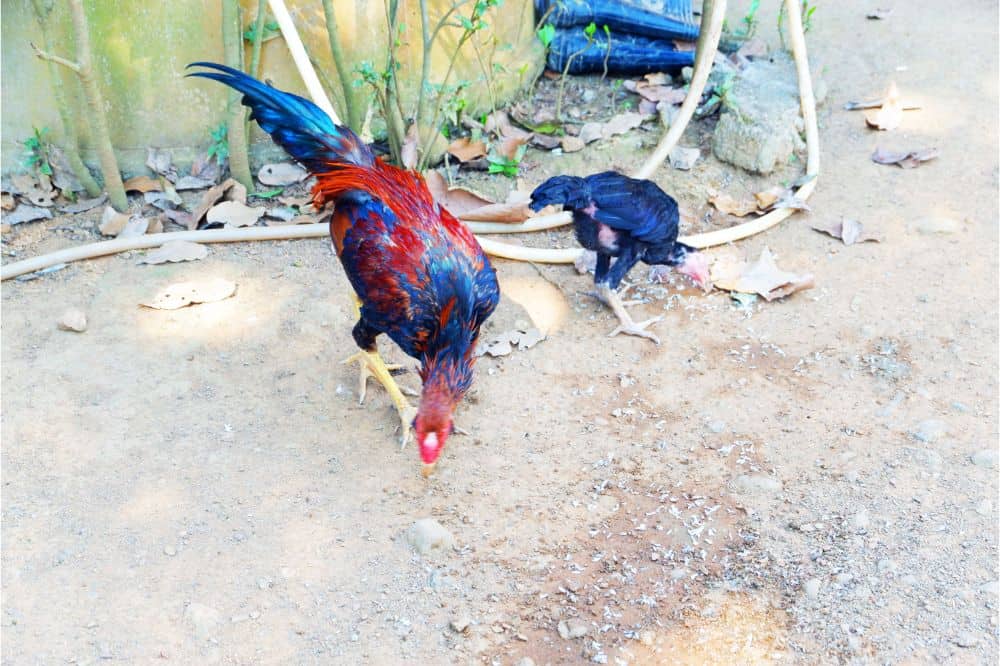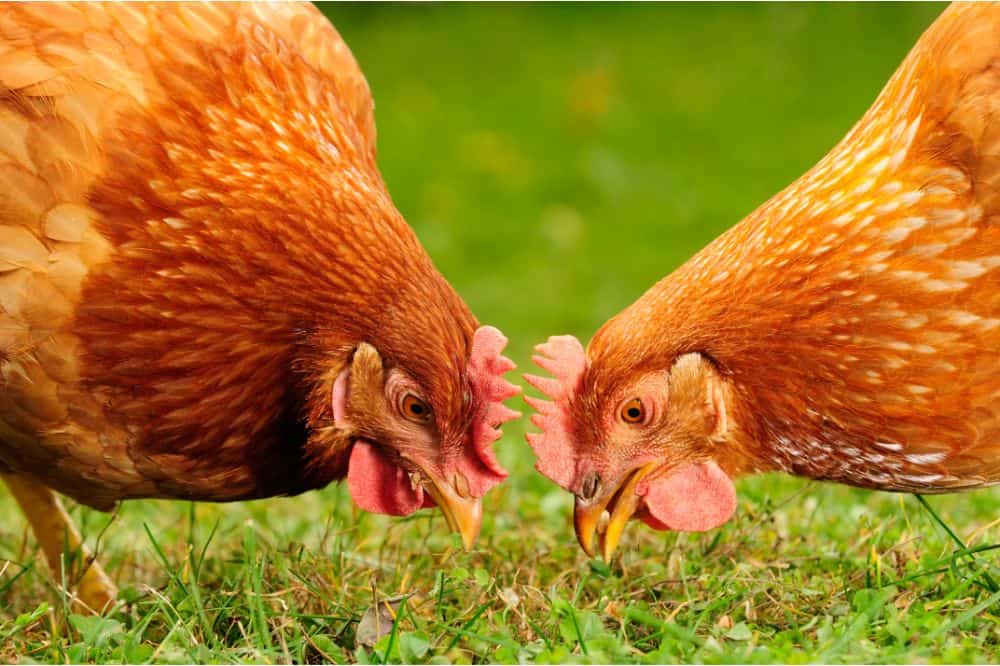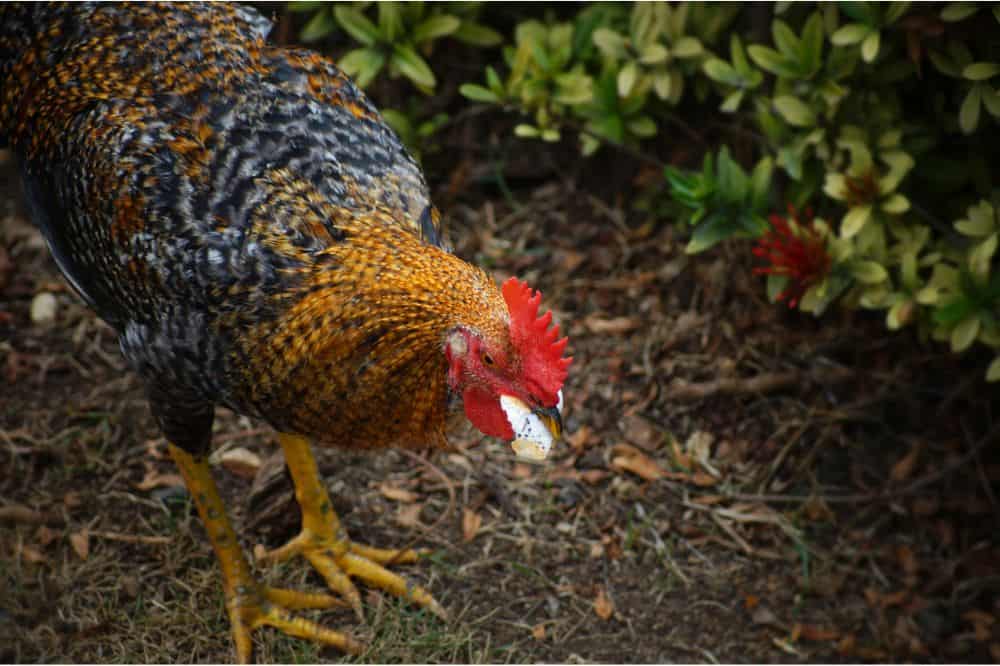For many people, keeping chickens is a great pleasure just for the joy of watching them pecking about and doing their chickeny things in the yard – and they also provide eggs, which is another great benefit they bring.
However, since they also love to eat bugs, they provide a useful pest control service – and to help you understand which ones are safe for them to consume, in this post, we answer the question, which bugs do chickens eat?
Is it ok for chickens to eat bugs and what are the advantages?
Domesticated chickens are descended from wild junglefowl, an omnivorous species native to Southeast Asia. These birds enjoy a hugely varied diet that includes fruit, seeds, all kinds of bugs and insects and even small vertebrates like lizards (Source: Chicken Identifier).
Their domesticated cousins share this appetite for eating just about whatever they can uncover, and bugs are a perfectly natural part of their diet, so it’s fine for chickens to eat bugs.
However, more than this, there are many advantages to allowing your chickens to eat bugs, both to the chickens themselves and to you.
Perhaps the most obvious of these is that chickens perform a natural bug reduction service, keeping pests under control that might otherwise enjoy snacking on your flowers or vegetables.
They can also help to keep pests like mosquitoes, flies and gnats under control – along with other unwelcome destructive or even dangerous species like termites or ticks.
For chickens themselves, insects and other bugs provide valuable protein, which is important for their muscles and growth. This may help supplement the food you buy for them and plug gaps in their nutrition while reducing the amount you have to spend on feed.
Finally, chickens that forage for themselves will have something to keep them occupied, which means you’ll have a healthier and happier flock.
At the same time, there are some bugs you need to be careful of – something we’ll come to in a moment – but let’s start by looking at the kind of bugs chickens like to eat.
Which bugs do chickens eat?

In short, chickens are unfussy eaters and will gobble up just about anything they find.
Grasshoppers and crickets provide a nutritious protein-filled snack for any chicken lucky enough to catch one, and they are also particularly partial to ants and termites – especially their larvae – which can help reduce the risk of your home being infested.
As we mentioned above, they are happy to eat ticks, something that helps protect your health since ticks can transmit some nasty diseases such as Lyme disease.
They will also eat things like centipedes, millipedes and earwigs, none of which pose any problems to chickens – unless you live in areas where large, stinging centipedes are present.
Chickens are also partial to cockroaches, weevils, flies, beetles of all kinds – including potato beetles – moths, aphids, spiders, caterpillars, slugs and snails.
So – with only a few exceptions – chickens will happily swallow down almost any kind of bug they find while they’re pecking about.
Which bugs don’t chickens eat?
Although they eat most bugs, there are a few that even a chicken won’t eat – but the list is short.
Chickens won’t touch stink bugs – which is understandable since these insects taste foul and are known to produce an extremely unpleasant odor when attacked.
Similarly, chickens won’t eat boxelder bugs, which, although not true stink bugs, are closely related and also have an unpleasant taste that chickens have learned to avoid.
Something else chickens won’t eat is bees – although they happily munch down hive beetles, and for this reason, some beekeepers have started keeping chickens close to their hives as a natural way of reducing the impact of this pest.
Which bugs cause problems?

Although chickens will eat almost any bug they find, there are a few that may cause issues.
Of course, there are a few stinging and biting bugs that can harm your chickens – but other than these, the main bugs to pay attention to are flies and mosquitoes.
1. Flies
Chickens and chicken keepers have a mixed relationship with flies. On the one hand, chickens happily eat flies and will sometimes even snatch them out of the air. They also love to eat their larvae, and this can help keep fly populations under control.
However, some fly species can carry diseases or parasites that can harm your chickens and spread quickly throughout your flock, so you need to be careful to protect your animals from this danger.
For example, common houseflies are known to be carriers of chicken tapeworm, and greenfly larvae can cause botulism – also known as “limberneck” – in chickens.
Furthermore, both of these species along with black blowflies can carry myiasis – aka flystrike – a painful and potentially fatal disease that can spread quickly once one chicken is infected.
2. Mosquitoes and biting gnats
Most people will be more than familiar with mosquitoes and other biting species like gnats, and these can be a problem for chickens just as they are for humans.
Chicken keepers should be wary of mosquitoes in particular since their bites can spread avian pox, something anyone with a flock of chickens will be keen to avoid.
This disease causes growths on the un-feathered parts of the birds – and in rarer instances, ulcerous lesions in the throat and mouth.
Once a single chicken is infected, the disease can be spread through dried scabs, secretions, blood, feather debris and skin dander – and since there is no treatment for avian pox, it’s far better to prevent an outbreak than treat your chickens once they are infected.
Biting gnats and black flies will also feed on the blood of your chickens – although, in most cases, this is more of an irritation than a serious problem.
3. Slugs
Slugs are also worth a mention in the list of bugs to look out for – because even though chickens will happily eat them, occasionally they can harm or even kill a chicken.
This is because slugs secrete slime as a defense mechanism, which makes them hard to swallow.
For this reason, if a chicken tries to eat a slug before it is dead, the increased slime can make the whole experience quite unpleasant for the chicken – and in rare instances, smaller chickens have been known to choke to death.
Protecting chickens from flies and mosquitoes
Since flies and mosquitoes pose the greatest risk to your flock, you should take steps to minimize the danger. Here are some of the most important things you should do.
1. Eliminate standing water
Mosquitoes require standing water to lay their eggs, so one of the most important things you can do to eliminate mosquitoes is to ensure there is no standing water near your chickens.
Mosquitoes don’t need much standing water to breed – even a cup of water left out on a table will do – so you’ll have to be extremely diligent in making sure none is found on or around your property.
2. Install fine mesh to protect chickens at night
Since most mosquitoes and other biting insects feed after sundown, you should install a fine mosquito mesh around your chicken coop to protect them.
However, this kind of mesh won’t protect against larger predators like raccoons or foxes, so you should also install a second outer layer of stronger wire mesh an inch or so outside the inner one.
3. Remove droppings from in and around the coop daily
Remove droppings daily to prevent flies from laying eggs there and to prevent parasites being passed from one chicken to another.
4. Change the litter frequently
As well as removing the droppings daily, you should also change the litter frequently for the same reasons.
5. Clean up after snack time
After feeding your chickens things like fresh fruit, always remove what they don’t eat after mealtime to prevent flies from laying eggs in it.
6. Clean food and water spills quickly
Similarly, you should clean up spilled food and water quickly to prevent flies from breeding in it.
7. Set fly traps
Setting up fly paper or other fly traps will help kill any flies present around your birds.
8. Provide proper ventilation
You should ensure your chicken coop is properly ventilated to prevent a build-up of moisture. This will stop flies breeding and laying eggs there. Also, cover the ventilation holes with fine mesh to stop insects getting in that way.
9. Mix diatomaceous earth with the litter
Food-grade diatomaceous earth contains microscopic particles that are harmless to chickens but that slice through the exoskeletons of flies and other insects – so by mixing some into the litter, you will kill any flies or other pests that manage to get in.
10. Plant insect-repelling plants
Planting certain plants like lavender or lemongrass can help repel flies and mosquitoes. It isn’t 100% effective though, so this should be used alongside all of the other methods we’ve mentioned.
11. Don’t use pesticide
Don’t be tempted to use pesticide to control flies, mosquitoes or other pests. It may kill the pests, but it is also dangerous for your birds and so should be avoided.
Most bugs are fine – but you still need to take some precautions
As we have seen, chickens will eat almost any bugs, and most of them are quite safe for them to consume.
However, some flies and mosquitoes can carry parasites and diseases, so if you want to keep your flock happy and healthy, you need to take certain precautions to protect them against these dangers.
